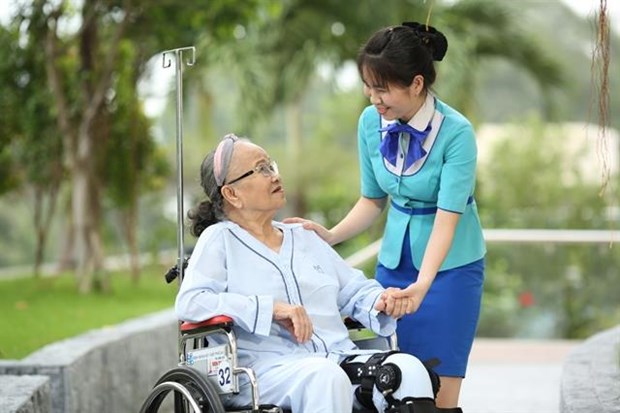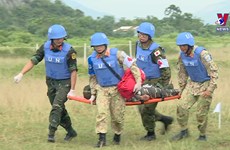Medical social workers add to efficacy of treatment: experts
Hospitals in Vietnam should pay more attention to medical social work which plays a vital role in facilitating good medical care and improving the quality of life of patients, experts have said.
 A social worker (R) at the
A social worker (R) at the
HCM City (VNS/VNA) - Hospitals in Vietnam should pay more attention to medical social work which plays a vital role in facilitating good medical care and improving the quality of life of patients, experts have said.
"Social work at hospitals is in a fledgling state with limited services compared to other countries, especially developed ones," said Le Thi Hoang Lieu, director of the social work programme at Thu Dau Mot University in Binh Duong province.
Hospital-based social work had been facilitated by Circular No.43 issued in 2015, she told a workshop held in Ho Chi Minh City this week.
But now medical social workers offer support to patients and their families only in the hospital, according to Lieu.
When patients leave the hospital, there is no support at all, causing some patients to give up treatment and increasing risks of complications.
Medical social workers work in a multi-disciplinary team with professionals from other disciplines and link patients and families with community resources.
High work loads and lack of resources to meet the needs of clients were among the challenges they face in Vietnam, experts said.
Dr Leanne Embry, clinical psychologist at University Health System, a public hospital in Texas, the US, said numerous research studies had demonstrated the importance of psychosocial support for cancer patients of all ages.
“Support can help prevent escalation of distress. We want patients to know they will not face this alone and the chances for survival or improvement of symptoms are real,” she said.
Psychosocial support focuses on emotional, social, physical, and spiritual needs of children and family, according to the doctor.
The goal is to help patients and their family adapt to the situation with minimal distress.
Psychosocial support providers are integrated with medical care and serve as a liaison between patients/families and medical teams.
Their role includes initial assessment of the family, social situation, cultural, religious beliefs, mental health history, employment status, and financial needs.
Emotional support for the entire family, patient education and anticipatory guidance, promoting treatment adherence, and end of life support are also included.
The psychosocial support model in the US comprises of three social workers, two psychologists, one child life specialist, and one nurse care coordinator.
Some teams include others such as art therapists, music therapists, chaplains and other religious leaders, according to Embry.
Every oncology patient meets multiple members of the team during diagnosis, and support is given throughout treatment and into survivorship.
“For patients and families, treating the pain, symptoms, and stress of cancer improves quality of life and is as important as treating the disease itself.”
In Vietnam, her hospital works with some hospitals in Hanoi, HCM City and Hue to create a robust psychosocial support programme, she added.
Stephanie Gonzalez, a child life specialist at University Health System, spoke about her role, which focuses on the psychosocial needs of children and their families.
Child life specialists promote coping through preparation, play, education and activities of self-expression, according to the specialist.
They educate caregivers, administrators, staff, and the public about the needs of children under stress.
They assist children in coping by preparation for procedures and hospitalisation, offering emotional support to children and their families, and being an advocate for both the patient and family.
Children who are coping successfully are knowledgeable about their condition and procedures, feel secure in their relationships with family and staff and recover quickly from procedures.-VNS/VNA













